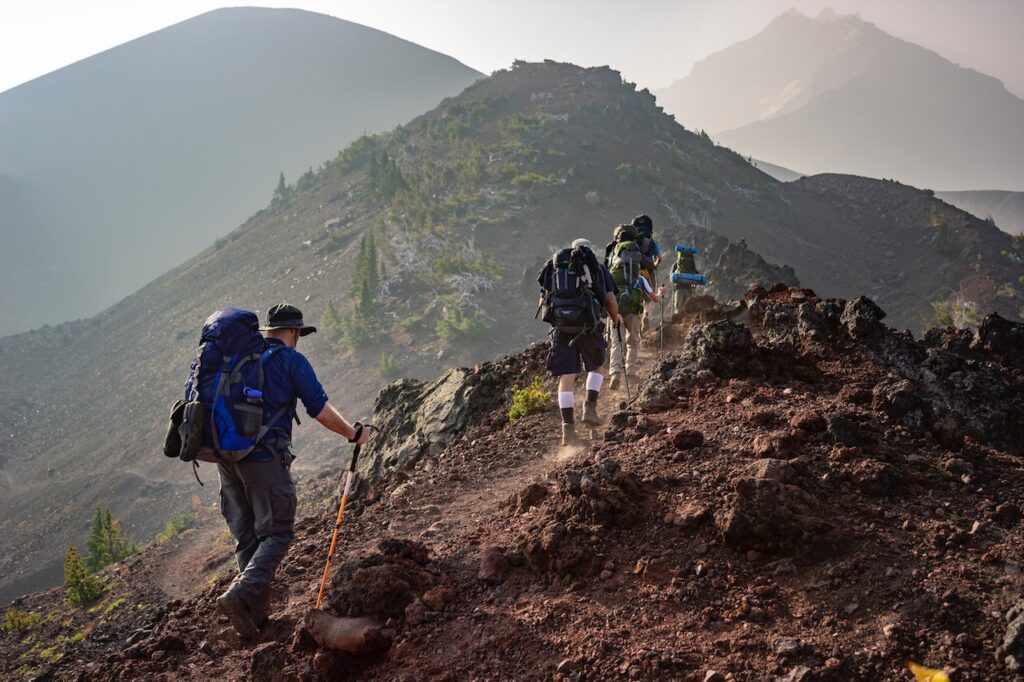
In this article, we delve into ten essential eco-friendly practices for Leave No Trace hiking, each designed to ensure that your journey through nature leaves behind only footprints, and takes with it unforgettable memories and a renewed commitment to preserving the beauty of our planet. Whether you’re an experienced hiker or a novice trailblazer, these principles will not only enhance your outdoor experience but also contribute to the long-term sustainability of our cherished natural spaces.
Plan and Prepare:
Before embarking on your hiking adventure, it’s essential to plan and prepare thoughtfully. Research the area you’ll be visiting to understand its unique environmental and safety considerations. Being informed about regulations and restrictions, as well as seasonal factors, will ensure you’re well-equipped for a low-impact journey. Consider hiking during off-peak times to avoid crowded trails, which can help preserve the tranquility of the wilderness.
Stick to Established Trails:
When hiking, it’s crucial to stay on designated paths and established trails. These paths have been carefully planned to minimize environmental impact, preventing soil erosion and safeguarding delicate ecosystems. Straying off the designated routes can lead to the destruction of fragile plant life, disturb wildlife habitats, and disrupt the balance of the natural world. By staying on the beaten path, you can enjoy your hike while protecting the very landscapes you’ve come to admire.
Pack Out What You Pack In:
Leave No Trace hiking begins with the simple principle of carrying out everything you bring into the wilderness. This means ensuring that all your trash, food scraps, and litter make their way back with you. By adopting a “pack it in, pack it out” mindset, you’re helping to keep the trails clean and preserving the natural beauty of the environment. Leaving no waste behind ensures that future hikers can enjoy the pristine wilderness as you have.
Proper Waste Disposal:
When nature calls while you’re out in the wilderness, it’s essential to dispose of human waste responsibly. Use established restroom facilities if available or, if not, dig a small hole at least 200 feet away from water sources to bury human waste properly. This not only prevents contamination of water sources but also maintains the aesthetic and ecological integrity of the landscape. Always pack out used toilet paper in a sealed bag to avoid littering the environment.
Camp Mindfully:
Camping in the backcountry offers an incredible opportunity to connect with nature, but it’s vital to do so mindfully. Choose designated campsites whenever possible, as these have been strategically placed to minimize environmental impact. Avoid creating new campsites or trampling on vegetation, which can lead to lasting damage. By respecting established camping areas and adhering to Leave No Trace principles, you can enjoy the wilderness responsibly, leaving it undisturbed for future generations to cherish.
Respect Wildlife:
Encountering wildlife can be a highlight of any outdoor adventure, but it’s vital to do so with respect and caution. Keep a safe distance from animals and avoid feeding them, as human food can be harmful to their health and disrupt their natural behaviors. Loud noises and sudden movements can stress wildlife, so move quietly and observe them from afar. By respecting their space and boundaries, you’ll be contributing to the protection of these creatures and maintaining the balance of their ecosystems.
Minimize Campfire Impact:
While campfires can be a cozy addition to camping, they can also have a significant impact on the environment. To preserve the landscape and protect limited wood resources, opt for a camp stove for cooking instead of making open fires. This reduces the risk of scarring the land and consuming valuable wood. In areas where campfires are allowed, use established fire rings or fire pans and always follow fire regulations to prevent wildfires and preserve the natural beauty of the surroundings.
Leave Natural and Cultural Features Undisturbed:
When hiking, it’s essential to appreciate and preserve both natural and cultural features you encounter. Do not pick plants, remove rocks, or disturb historical or archaeological sites. These features are essential components of the environment and may have significant cultural or historical value. Leaving them undisturbed ensures that the landscape remains intact and can be enjoyed by future generations with the same sense of wonder and respect.
Reduce Noise Pollution:
The serenity of the wilderness is one of its most cherished aspects, and excessive noise can disrupt not only the peace and quiet but also wildlife. Minimize noise pollution by keeping conversations and other sounds to a minimum. The tranquility of the environment enhances the hiking experience and allows for better wildlife observation. By being mindful of noise levels, you can help protect the natural soundscape of the outdoors.
Share Leave No Trace Principles:
Lastly, one of the most impactful things you can do as a responsible hiker is to share Leave No Trace principles with fellow outdoor enthusiasts. Educate others about the importance of responsible outdoor recreation and the long-lasting benefits of preserving our natural spaces. By spreading awareness and encouraging others to follow these principles, you contribute to a collective effort to protect and conserve the environment for current and future generations.